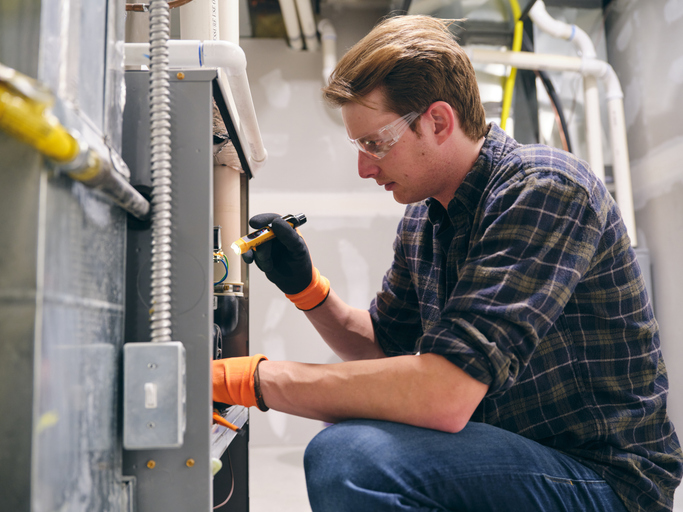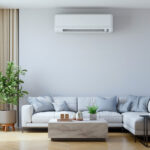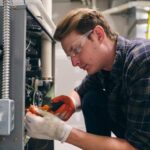
Why Does My Furnace Keep Shutting Off?
Does your furnace keep shutting off after running for only a few minutes? Does it turn back on all of its own? If that sounds familiar to you, then the issue with your furnace could come from one of these three things: the heat exchanger, the flame sensor rod, or the size of your furnace. There are also other reasons the furnace keeps shutting off, we will look at them in this publication.
There are some quick fixes you can try on your own. You can change your furnace’s filter if it’s dirty. Then, you can also try opening all your air supply vents. Both these things can make your furnace work harder than it needs to, which can cause it to overheat and turn off. If it doesn’t work, you’ll need to call in a professional to help fix your furnace.
In this article, you will find the answer to “Why does my furnace keep shutting off and what to do about it?”
The Heat Exchanger is Overheating
A common reason a furnace short cycles is because the heat exchanger, which is the part that heats your air, is getting too hot due to a lack of airflow. Once the heat exchanger overheats, it trips the high-limit switch, which shuts the furnace down to protect it. If the high-limit switch goes bad, the furnace won’t shut down and the heat exchanger will crack. The lack of airflow could be the result of a dirty air filter, closing air supply vents around your house, or a dirty blower wheel.
If the filter gets too dirty, the blower will struggle to pull in enough air over the heat exchanger. Closing too many air vents can slow down certain blower types and therefore reduce airflow. Also, over time, the blower wheel collects dirt, slowing it down and therefore limiting how much air it can deliver over the heat exchanger. This is why we suggest the initial DIY fixes, which could solve the issue. To clean the blower, however, it’s best to call a specialist!
The Flame Sensor Rod is Dirty
If your furnace tries to turn on multiple times before stopping for a while, the problem is probably a soot-covered flame sensor rod. You might be wondering what the flame sensor rod is and why it can cause short cycling if covered in soot.
Well, the flame sensor rod is a safety device designed to detect a flame in your furnace burners. If it does not detect a flame, it shuts the gas valve. Normally, this is a good thing for you, because if it didn’t shut the gas valve, your furnace could fill your home with gas. And one well-lit match could cause an explosion. However, if the flame rod gets covered in soot, it can’t accurately tell if there’s a flame or not, so it shuts the gas valve, even if there is a flame. No gas means no flame, which means no heat for you.
The solution is pretty straightforward; clean the flame sensor rod. Since this isn’t an easy DIY job, you should definitely call a professional. You can utilize the services of McMillin Air.
The Furnace is Oversized
Has this short cycling problem been going on for years? Or did you just get a new furnace? If you answered one of these questions in the affirmative, the reason your furnace keeps shutting off could be that your furnace is not sized properly for the size of your home. The heater needs to be sized just right or you’ll have issues. For example, an oversized furnace will heat the home too quickly, causing it to turn off and on too often.
If this is your problem, you have a few options depending on how old your furnace is. If it’s brand new, contact your installer about this issue so they can fix it. Some contractors will give you a labor warranty on their work, so give them a call to find out what your options are. If it’s old, usually meaning older than 15 years, consider getting a new furnace. Make sure that your contractor calculates the right furnace size for your home!

Your Air Filter Is Blocked
When the air filter in your heater becomes clogged with dirt, it restricts airflow to the heat exchanger, causing it to overheat. This triggers the high-limit switch, which is a safety feature that shuts off the furnace.
To address this issue, simply switch off the furnace and replace the filter if it’s disposable. Dirty air filters can introduce dust and debris into your heating system, and a completely clogged filter can halt airflow altogether.
Permanent filters, which offer better protection for your furnace and are more environmentally friendly, can be cleaned and reused.
Regardless of the type of filter you use, it’s important to inspect it monthly and replace or clean it at least every 90 days.
For improved airflow, consider opening some of your vents and having your furnace blower wheel cleaned.
Your Exhaust Vent is Obstructed
When your furnace exhaust vent is blocked, it can cause the accumulation of dangerous combustion byproducts like carbon monoxide, potentially triggering a safety shutdown of the furnace.
If you suspect or find that your furnace exhaust vent is obstructed, it’s crucial to address the issue promptly to ensure the safe and effective operation of your heating system.
Turn off the heater and open windows and doors to aid ventilation. If you’re unable to locate the obstruction or can’t safely clear any debris without risking damage to your home’s air vents, it’s advisable to contact a professional HVAC technician. They’ll have the expertise to remove the blockage and install vent caps or covers to prevent any future obstructions.
Malfunctioning Blower Motor
Why does your furnace keep shutting off? A potential cause could be a faulty fan motor. The blower wheel, equipped with blades, is responsible for circulating air throughout your heating system, but if it becomes dirty, it can operate inefficiently or cease functioning altogether.
Without a properly functioning furnace blower fan, your furnace will experience inadequate airflow, hindering its ability to reach the desired temperature.
If you detect a burning odor, notice an increase in utility bills, or experience frequent on-off cycles with your furnace, it’s advisable to inspect the blower motor. Prevent it from becoming clogged by regularly replacing your air filters; a dirty filter can introduce debris and dust into the air vents, ultimately impacting the blower motor’s performance.
Your High Limit Switch is Activated
The high-limit switch installed in a furnace serves as a safety mechanism, monitoring the internal temperature of the furnace. If the temperature surpasses a preset threshold, the high-limit switch will automatically deactivate the burners to prevent overheating and potential damage to the furnace. Activation of the high-limit switch indicates that the furnace is encountering conditions that could lead to unsafe temperatures.
Various factors can trigger the activation of the high-limit switch. It’s essential to check for and resolve issues such as restricted airflow, a dirty heat exchanger, blocked vents, or malfunctioning components. This may involve tasks like replacing the air filter, cleaning the evaporator coil, inspecting the blower motor, and ensuring adequate ventilation.
If you’re uncertain about diagnosing or resolving the problem, or if the high-limit switch continues to trip despite resetting it, it’s advisable to seek assistance from a qualified HVAC professional. They can conduct a comprehensive inspection, identify the underlying cause, and carry out necessary repairs to guarantee the furnace’s safe and efficient operation.
Conclusion
Short-cycling, or having a furnace turn off and on quickly and more often than you have programmed, is a big problem for homeowners. It’s not just incredibly annoying; heating bills can become ridiculously expensive if the inefficient heating pattern continues.
If the furnace keeps shutting off and you can’t find the cause on your own, you should contact professionals. McMillin Air will solve all your heater and furnace problems.








0 comments